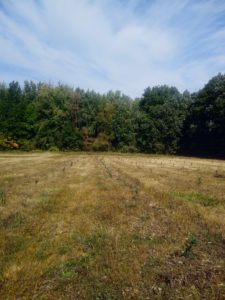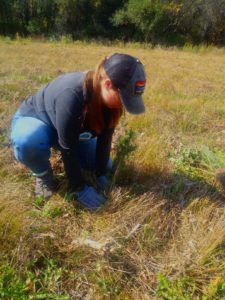On the Ground: Consumers Energy Funds Planting of 2,500 Native Trees at Fulton SGA

One of the fields in the Fulton State Game Area showing the newly-planted white spruce. October 6, 2020.
On Tuesday, October 6, the On the Ground program returned to the field to kick off the planting of 2,500 native tree species at the Fulton State Game Area (SGA). These trees were funded entirely by the Consumers Energy Foundation and will enhance habitat for an abundance of wildlife within the state game area.
Originally designed to be a volunteer event for Consumers Energy staff during Earth Day this past April, restrictions due to COVID-19 prevented the original volunteers from attending the event and it was postponed until October. Since COVID-19 restrictions remained in place, it was determined that the event would make a great day for the MUCC field team to get outdoors and kick-start the planting of the trees. Michigan Department of Natural Resources (MDNR) staff will finish planting the remaining trees next week.
Fulton SGA is made up of 670 acres and is located in southwest Kalamazoo county. Primarily dominated by wetlands along Bear Creek, this SGA also contains forest and agricultural fields in the upland areas of the property. This tree-planting project took place in two of the large agricultural fields located along S 44th Street on the west side of the SGA.

MUCC On the Water (OTW) Coordinator Emma Nehan plants white spruce during the October 6 event at Fulton SGA.
Of the 2,500 trees, 2,400 trees were white spruce and 100 trees/shrubs were red osier dogwood. Conifer trees like white spruce not only provide foraging material with their seeds, but their dense foliage provides ideal nesting conditions for many species. Additionally, the year-round needles of these conifers can provide wildlife with cover from predators and thermal protection throughout the winter months. Mast-producing tree or shrub species like red osier dogwood that bear fruit provide wildlife with supplemental foraging material and cover, and the benefits of these native trees can reach species that range from white-tailed deer and wild turkeys to songbirds and pollinators.
A large thank you to Consumers Energy for promoting the continued health and stewardship of public lands across Michigan.
To learn more about the On the Ground program and to participate in wildlife habitat improvement events near you, please visit www.mucc.org/on-the-ground , www.facebook.com/muccotg or contact MUCC Habitat Volunteer Coordinator Makhayla LaButte at mlabutte@mucc.org.
The post On the Ground: Consumers Energy Funds Planting of 2,500 Native Trees at Fulton SGA appeared first on Michigan United Conservation Clubs.
Recent Posts



